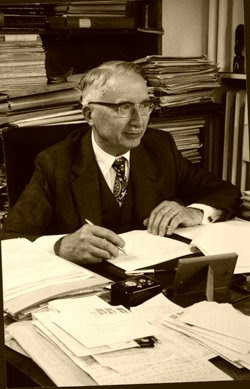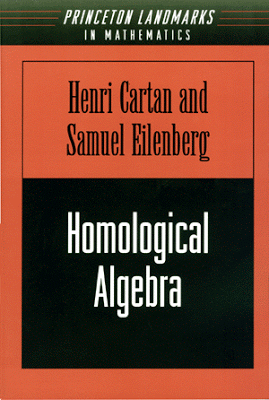Philosophy
 Henri Paul Cartan
Henri Paul Cartan
July 8th, 1904 to August 13th, 2008

"Henri Cartan, French Mathematician, Is Dead at 104"
by
Kenneth Chang
August 25, 2008
The New York Times
Henri Cartan, a mathematician known for meticulous proofs and for inspiring a revival of mathematics in France after World War II, died in Paris on Aug. 13. He was 104.
His death was confirmed by the American Mathematical Society.
"He's a mathematician that contributed in two different ways to the subject," said John Morgan, a professor of mathematics at Columbia University. "There was his own work, which was quite influential. But just as influential were the students that he had, which led to the generation of French mathematicians that, at its high point, were the best in the world."
In the 1930s, Dr. Cartan was a founding member of a group of French mathematicians who set out to rigorously write down the foundations of mathematics; the group published papers under the pseudonym Nicolas Bourbaki. Many of France's top mathematicians and scientists had died during World War I.
"We were the first generation after the war," Dr. Cartan recalled in an interview with the American Mathematical Society in 1999. "Before us there was a vide, a vacuum, and it was necessary to make everything new."
Dr. Cartan said the Bourbaki group was the beginning of a mathematical renewal.
Through sometimes argumentative collaboration, the Bourbaki group worked to establish the foundations for different areas of mathematics, an approach that was highly influential for decades.
"He liked things to be perfect," said Jean-Pierre Serre, an eminent mathematician who was one of Dr. Cartan’s graduate students.
Again, after World War II, Dr. Cartan, who stayed in Paris while many mathematicians left for other countries, inspired a revival of the study of math in France.
He started a seminar series that ran from 1948 until 1964. Each year, a different topic was tackled in depth and detail.
"Nothing was left in the shadows," recalled Luc Illusie of the University of Paris-Sud, in a tribute published in 2004 for Dr. Cartan’s 100th birthday.
"There was no 'black box,'" he continued. "The necessary preliminaries and background were presented in detail. The proofs were not simply 'sketched' but presented completely. Cartan was concerned that one should understand, a legitimate concern that is no longer so widespread, it seems to me. Many times I saw him interrupt a lecture to ask the speaker to 'light the way.'"
In his research, Dr. Cartan worked in several areas, but perhaps the most significantly in a field known as homological algebra, which applied the technique of algebra to topological spaces.
A doughnut is intrinsically different in shape from a sphere because of the central hole; the algebraic calculations enable mathematicians to differentiate many different spaces.
"It's a way to compute with spaces," Dr. Morgan said.
Together with Samuel Eilenberg, Dr. Cartan wrote the fundamental textbook for the subject. Although it was published in 1956, Dr. Morgan said he still taught with it.
Dr. Morgan recalled attending a gala in Paris in 1974 for Dr. Cartan's 70th birthday. "He was the grand old man of French mathematics," Dr. Morgan said. "There was no doubt about that. They deferred to him and treated him with enormous respect."
Henri Cartan was born in 1904, the son of Élie Cartan, one of the most famous mathematicians of the early 20th century. He received a doctorate in mathematics from the École Normale Supérieure in Paris.
Dr. Cartan taught at the University of Strasbourg from 1931 to 1940 and at the École Normale from 1940 to 1965.
After World War II, Dr. Cartan helped French and German mathematicians re-establish academic connections even though the Germans had executed a younger brother of his, who was a member of the French resistance.
Dr. Cartan later taught at the University of Paris-Sud at Orsay until he retired in 1975.
He received the Wolf Prize in Mathematics in 1960, one of the highest awards in the field.
"All by himself, he put the level of French mathematics much higher," Dr. Serre said.
"Interview with Henri Cartan"
- Deceased--benoît B. Mandelbrot
Benoît B. Mandelbrot November 20th, 1924 to October 14th, 2010 "Benoît Mandelbrot, Novel Mathematician, Dies at 85" by Jascha Hoffman October 16th, 2010 The New York Times Benoît B. Mandelbrot, a maverick mathematician who developed the field of fractal...
- Erdős Numbers
Say what...Erdős numbers? It's...like, a mathematical attempt at humor. Wikipedia... The Erdős number...describes the "collaborative distance" between a person and mathematician Paul Erdős, as measured by authorship of mathematical papers. It...
- Deceased--israel M. Gelfand
Israel M. Gelfand September /August [?] 1913 to October 5th, 2009 "Israel Gelfand, Math Giant, Dies at 96" by Kenneth Chang October 8th, 2009 New York Times Israel M. Gelfand, one of the giants of 20th-century mathematics, whose work cleared paths for...
- Deceased--john R. Stallings Jr.
John R. Stallings Jr. 1935 to November 24th, 2008 "John R. Stallings Jr., 73, California Mathematician, Is Dead" by Kenneth Chang January 19th, 2009 The New York Times John R. Stallings Jr., who found a proof for part of the Poincaré Conjecture, one...
- Deceased--oded Schramm
Oded Schramm December 10th, 1961 to September 1st, 2008 "Oded Schramm, 46, Mathematician, Is Dead" by Kenneth Chang September 11th, 2008 The New York Times Oded Schramm, who melded ideas from two branches of mathematics into an equation that applies...
Philosophy
Deceased--Henri Paul Cartan
 Henri Paul Cartan
Henri Paul CartanJuly 8th, 1904 to August 13th, 2008

"Henri Cartan, French Mathematician, Is Dead at 104"
by
Kenneth Chang
August 25, 2008
The New York Times
Henri Cartan, a mathematician known for meticulous proofs and for inspiring a revival of mathematics in France after World War II, died in Paris on Aug. 13. He was 104.
His death was confirmed by the American Mathematical Society.
"He's a mathematician that contributed in two different ways to the subject," said John Morgan, a professor of mathematics at Columbia University. "There was his own work, which was quite influential. But just as influential were the students that he had, which led to the generation of French mathematicians that, at its high point, were the best in the world."
In the 1930s, Dr. Cartan was a founding member of a group of French mathematicians who set out to rigorously write down the foundations of mathematics; the group published papers under the pseudonym Nicolas Bourbaki. Many of France's top mathematicians and scientists had died during World War I.
"We were the first generation after the war," Dr. Cartan recalled in an interview with the American Mathematical Society in 1999. "Before us there was a vide, a vacuum, and it was necessary to make everything new."
Dr. Cartan said the Bourbaki group was the beginning of a mathematical renewal.
Through sometimes argumentative collaboration, the Bourbaki group worked to establish the foundations for different areas of mathematics, an approach that was highly influential for decades.
"He liked things to be perfect," said Jean-Pierre Serre, an eminent mathematician who was one of Dr. Cartan’s graduate students.
Again, after World War II, Dr. Cartan, who stayed in Paris while many mathematicians left for other countries, inspired a revival of the study of math in France.
He started a seminar series that ran from 1948 until 1964. Each year, a different topic was tackled in depth and detail.
"Nothing was left in the shadows," recalled Luc Illusie of the University of Paris-Sud, in a tribute published in 2004 for Dr. Cartan’s 100th birthday.
"There was no 'black box,'" he continued. "The necessary preliminaries and background were presented in detail. The proofs were not simply 'sketched' but presented completely. Cartan was concerned that one should understand, a legitimate concern that is no longer so widespread, it seems to me. Many times I saw him interrupt a lecture to ask the speaker to 'light the way.'"
In his research, Dr. Cartan worked in several areas, but perhaps the most significantly in a field known as homological algebra, which applied the technique of algebra to topological spaces.
A doughnut is intrinsically different in shape from a sphere because of the central hole; the algebraic calculations enable mathematicians to differentiate many different spaces.
"It's a way to compute with spaces," Dr. Morgan said.
Together with Samuel Eilenberg, Dr. Cartan wrote the fundamental textbook for the subject. Although it was published in 1956, Dr. Morgan said he still taught with it.
Dr. Morgan recalled attending a gala in Paris in 1974 for Dr. Cartan's 70th birthday. "He was the grand old man of French mathematics," Dr. Morgan said. "There was no doubt about that. They deferred to him and treated him with enormous respect."
Henri Cartan was born in 1904, the son of Élie Cartan, one of the most famous mathematicians of the early 20th century. He received a doctorate in mathematics from the École Normale Supérieure in Paris.
Dr. Cartan taught at the University of Strasbourg from 1931 to 1940 and at the École Normale from 1940 to 1965.
After World War II, Dr. Cartan helped French and German mathematicians re-establish academic connections even though the Germans had executed a younger brother of his, who was a member of the French resistance.
Dr. Cartan later taught at the University of Paris-Sud at Orsay until he retired in 1975.
He received the Wolf Prize in Mathematics in 1960, one of the highest awards in the field.
"All by himself, he put the level of French mathematics much higher," Dr. Serre said.
"Interview with Henri Cartan"
- Deceased--benoît B. Mandelbrot
Benoît B. Mandelbrot November 20th, 1924 to October 14th, 2010 "Benoît Mandelbrot, Novel Mathematician, Dies at 85" by Jascha Hoffman October 16th, 2010 The New York Times Benoît B. Mandelbrot, a maverick mathematician who developed the field of fractal...
- Erdős Numbers
Say what...Erdős numbers? It's...like, a mathematical attempt at humor. Wikipedia... The Erdős number...describes the "collaborative distance" between a person and mathematician Paul Erdős, as measured by authorship of mathematical papers. It...
- Deceased--israel M. Gelfand
Israel M. Gelfand September /August [?] 1913 to October 5th, 2009 "Israel Gelfand, Math Giant, Dies at 96" by Kenneth Chang October 8th, 2009 New York Times Israel M. Gelfand, one of the giants of 20th-century mathematics, whose work cleared paths for...
- Deceased--john R. Stallings Jr.
John R. Stallings Jr. 1935 to November 24th, 2008 "John R. Stallings Jr., 73, California Mathematician, Is Dead" by Kenneth Chang January 19th, 2009 The New York Times John R. Stallings Jr., who found a proof for part of the Poincaré Conjecture, one...
- Deceased--oded Schramm
Oded Schramm December 10th, 1961 to September 1st, 2008 "Oded Schramm, 46, Mathematician, Is Dead" by Kenneth Chang September 11th, 2008 The New York Times Oded Schramm, who melded ideas from two branches of mathematics into an equation that applies...
